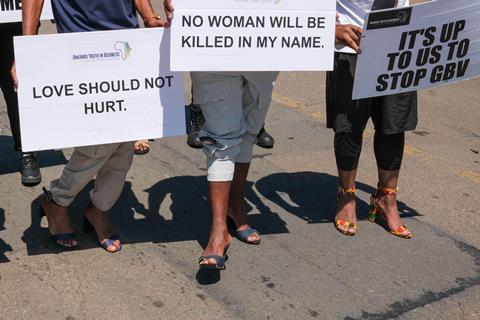Writer Jenny Sanders addresses a deeply sobering reality, urging us not to look away from the gender-based violence devastating South Africa. Her words call us to compassion, vigilance, and a faith-filled response to those who suffer.

On 24th August, 2019 Cape Town student Uyinene Mrwetyana went to collect a parcel from her local post office. The attendant, Luyanda Botha, requested she try in the afternoon, despite the office closing at 1pm. On her return, Botha, who had sent his colleague home early, locked the door and attacked the teenager. She was raped, strangled and bludgeoned to death. The next day he collected her body, took it to a field, doused it in petrol and set it alight.
Media coverage of ‘Nene’s’ disappearance was extensive, the hashtag #BringNeneHome trending across social media platforms. I remember it vividly because I was in Cape Town myself.
READ MORE: With the rise and prevalence of sexual offences, believers everywhere need to confront sexual violence honestly - both in society and in Church
Statistics for rape and femicide in South Africa have always been horrifying. Previously called the rape capital of the world a title now held by The Congo, where it’s estimated that 48 women are raped every hour, femicide has risen by 33.8% in the last year, escalating to five or six times the global average. It’s estimated that a woman is killed there every 2.5 hours.
In 2019, the government labelled it a crisis. President Cyril Ramaphosa announced a number of reforms including harsher sentences for sex offenders and a National Registerer of sex offenders in the public domain. It was not enough.
Still the women were being killed. The NGO Women for Change was established in 2016 and advocates for greater awareness about gender-based violence, educating people and providing safe, accessible support for victims and survivors as well as fighting for justice, accountability and reform.
READ MORE: What will boys be?
On Friday 21st November, Women for Change encouraged all the women of South Africa to withdraw from society and the economy for a day by not going to school, university or doing any paid work, and not spending any money. Wearing black or purple as signs of mourning and grief, women – joined by some men – were encouraged to simply lie down for fifteen minutes at noon in total silence to honour the memory of the thousands of women who have been killed.
Fifteen locations across the country were chosen for the protest. Supporters added purple filters to their social media profiles in solidarity with the women. Marches were held with many people carrying banners, placards and even fake coffins to emphasise the message that enough is enough. It will be seen as a victory because gender-violence has subsequently been recognised and upgraded to a National Crisis. Women for Change are celebrating cautiously; the ongoing impact remains to be seen.
The G20 has just met in Johannesburg from 22nd–23rd November, so it was the perfect time to draw attention to the crisis on a global stage
The G20 has just met in Johannesburg from 22nd–23rd November, so it was the perfect time to draw attention to the crisis on a global stage. In preparation, a petition containing one million signatures was delivered to the government before the national shutdown.
READ MORE: Violence against women as a weapon of war is everywhere but many do not live to tell their stories
The UK statistics aren’t on the same scale as those in South Africa. However, figures show that during the period April 2019–March 2022, at least one woman a week was killed by either her male partner or ex-partner. Of 888 women killed between 2009 and 2018, 43% had either separated or taken steps to do so from their perpetrator. It’s estimated that the police receive a call about domestic violence every 30 seconds (reporting only a fraction of incidents) and around three women a week die by suicide as a result of domestic abuse. According to the femicide census, a woman is now killed here every three days This is alarming reading.
Our churches and our friends are not immune from domestic violence and its consequences.
Our churches and our friends are not immune from domestic violence and its consequences. None of us know what goes on behind closed doors. Without fear-mongering, let’s banish naivety, be alert, pray, support and build quality relationships of solid trust between one another.
A quick glance at our Bibles reminds us that God created woman as the pinnacle of creation. That men would abuse that gift is an offence to us and even more so to the God who designed women to work in equal partnership with men in the world he gave them. Together we were to reflect the mutual honour of the Godhead relationships.
Let’s take on the responsibilities faith-filled sisterhood in standing with the vulnerable, the hurting and the abused, lifting them in prayer and advocating for them.
If any of these issues have affected you, you can call Premier Lifeline for support. Premier Lifeline is a national, confidential helpline offering a listening ear, emotional and spiritual support from a Christian perspective. If you would like someone to talk with and pray for you, call Premier Lifeline on 0300 111 0101.




































No comments yet